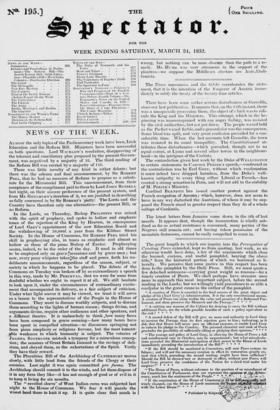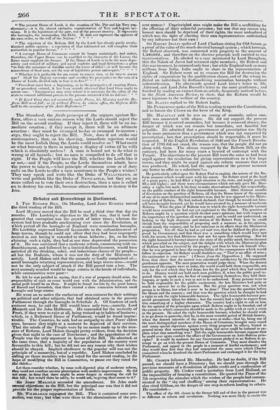The great length to which our inquiry into the Prerogative
of Creating Peers extended, kept us from quoting, last week, as we otherwise would have done, a few of the arguments which close the learned, curious, and useful pamphlet, bearing the above title,* from the historical portion of which we borrowed so li- berally. We perceive that some justice in this respect has been done to the pamphlet by the Daily Press. Still, we must quote a few detached sentences—carrying great weight as reasons—for a tit:hely" creation of Peers. We 'shall perhaps have occasion once more to approach this most important subject, before the second reading in the Lords; but we willingly yield precedence to so able a coadjutor in the great cause as the author of the pamphlet.
"A creation of Peers is essential to the final success of the great object and pledge of his (Earl Grey's) Administration. It is the only constitutional means. - A creation of Peers can alone realize the value and promises of a Reformed Par- liament, and alone preserve the Monarch and the Peerage !" * " Amnitting any reasons of the Cabinet for desiring to carry the Bill without additional Peers, are the whole possible benefits of such a policy equivalent to the risk? " * "A second defeat of the Bill will give no more real authority to Lord Grey to increase the Peerage than its first rejection gave to him; indicating, as it did, that that House will never pass an efficient measure, or enable Lord Grey to redeem his pledge to the Country. The personal character and rank of Peers precludes the possibility of sufficiently sifting or pledging their opinions." * * * "The courage and policy of Lord Grey; in allowing the House of Peers a full and uninfluenced veto in October, may be unquestioned; but what ruiscalcula- . lions preceded the Ministerial anticipation of their power in the House of Lords immediately preceding the introduction of the Bill ?" * * * * ' "If the Bill should be mutilated in Committee, will new Peers restore its fulness,- and will not the necessary creation to effect its restoration greatly ex- ceed that which, preceding the second reading, might have been sufficient? Should the Bill be throwzr-out or destroyed in effect, without new Peers, will Lord Grey preserve the confidence of the Nation for a third trial under his auspices?" * * "The House of Peers without reference to the question of an amendment of the Constitution of Parliament, does not represent the_opinkons iiito- cracy, much less the sentiments of the People." * .1_ v "If the constitution of the House of Commun.? is4ter.‘:4 wisely changed, can the House of Lords maint with the Lower House?" * * • Published by Ridgwa "The present House of Lords is the creation of Mr. Pitt and lie Tery pro- -alecessors,—it is the almost exclusive epresentation of Tory and bygone opi- slims. It is the legislature of the past, not of the present century. It represents the boroughs, the monopolies, the Debt. -It does not represent the opinions of its own order, or the will of the Nation." * * 5 '4 "The rejection of the Reform Bill by the Lords has already partly revolu- tionized public opinion : a repetition of that infatuated act will complete their textinetion in popular favour." *
"A corrupt House of Commons cannot be longer maintained ; and unless, therefore, the Upper House can be modified to the character of the Lower, the 3atter must supplant the former. If the House of Lords is to be the mere depo- sitory and reward of military and naval exploits and legal distinction—a place 'to hide the surnames of families under the cover of titles '—it will become the amausolemn of dead men, not the seat of legislative power and respect." * " Whether is it preferable for one estate to coerce two, or for two to coerce one? Shall his Majesty surrender and sacrifice Ii s prerogative to the veto of a _House of Lords, divided only as four is to five ?"
"Precedent must have a beginning, as in the prerogative of creating Peers. If no precedent existed, it has been acutely observed that Lord Grev ought to create one. 'Emergencies may arise where it is necessary for the safety of the state to commit additional powers to the persons intrusted with its defence."
i1fLor,l Grey does not eventually nuthe Peers, his Ministry and the Re-. fumeBill must flail; or if; without Peers, he retain qllice, the Reprni Bills =ill be the measures of the Anti-Ryininers !"



























 Previous page
Previous page